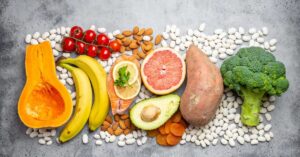Natural food, unprocessed and free from synthetic ingredients, is gaining popularity fast. Scientific studies show that organic foods have more nutrients and fewer pesticides.
A food scoring system in 2021 even ranked legumes, fruits, and fish as top choices for health. Plus, eating natural foods can lower risks of Type 2 Diabetes and some cancers.
Ready to learn how natural foods can change your life? Let’s dig in!
What Are Natural Foods?
Natural foods are simple, clean, and close to their original state. They avoid synthetic chemicals like preservatives, dyes, or artificial flavors. Fresh produce, lean proteins, whole grains, and healthy fats are great examples.
These foods often come from local farms or organic sources that focus on quality over mass production. Non-GMO options also count here since they skip genetic modifications. Food in its purest form is the best fuel for your body.
Unprocessed foods pack more nutrients than processed ones filled with sugar and unhealthy fats. Organic food shows lower levels of toxic heavy metals like cadmium—great news for long-term health! Choosing chemical-free options supports both your well-being and clean eating goals while reducing exposure to harmful additives.
Moving toward natural choices unlocks countless benefits for a healthier lifestyle ahead!
Key Benefits of Natural Foods

Natural food offers significant health benefits. They can genuinely help you feel healthier, both physically and mentally.
Improved Nutritional Value
Organic produce often contains higher levels of nutrients compared to conventional options. Studies show that pesticide-free fruits and vegetables offer better vitamins, minerals, and antioxidants.
For example, dark leafy greens like spinach pack more iron and calcium when grown without chemicals.
Eating nutrient-dense foods supports overall health. Small fish like sardines provide omega-3s and calcium, while eggs deliver high-quality protein. A diet rich in these options may lower risks of Type 2 diabetes and certain cancers.
Scientific research links organic food consumption with improved long-term health outcomes.
Reduced Exposure to Additives and Preservatives
Cutting out synthetic additives lowers health risks. Many of these chemicals, like artificial dyes or preservatives, can cause allergies and other reactions in sensitive people. Natural foods avoid this by using safer options from plants or essential oils.
These natural substitutes even add nutritional benefits while keeping food fresh.
Synthetic additives have raised safety concerns for years. Regulatory groups in the U.S. and EU keep a close eye on them but differ on what they allow. This makes chemical-free choices more appealing to consumers looking for healthy eating habits.
Choosing clean-label products supports nontoxic lifestyles and sustainable agriculture practices too!
How to Incorporate Natural Foods Into Your Diet
Eating natural foods can feel overwhelming at first, but it doesn’t have to be. Small steps make the process easier and more sustainable.
- Plan Your Meals
Make a weekly meal plan with fruits, vegetables, and whole grains as the focus. This saves time and helps avoid processed food temptations. Plus, having a grocery list stops impulse buying, especially if you shop after a meal instead of on an empty stomach.
- Cook More at Home
Homemade meals give you full control over ingredients. Try easy dishes like vegetable stir-fry or grilled chicken with quinoa. Experimenting in your kitchen makes healthy eating fun and rewarding!
- Choose Whole Grains
Swap refined bread and pasta for options like brown rice or oatmeal. These boost energy and help cut risks of diabetes, heart disease, and cancer over time. Small swaps add up quickly!
- Snack Smartly
Replace chips or candy with raw nuts, fresh fruits, or yogurt drizzled with honey. Keep these snacks handy for busy days when hunger strikes out of nowhere.
- Stay Hydrated
Drink plenty of water throughout the day to reduce appetite and improve metabolism. Aim for 8 glasses daily to support weight management goals while keeping energy levels stable.
- Shop Mindfully
Read labels carefully to pick nutrient-dense foods without added sugars or chemicals hiding inside them! Stick mostly to fresh produce sections instead of packaged or frozen aisles.
- Gradually Add Changes
Start small by replacing just one processed item each week with something natural like apples or carrots instead of sugary snacks—small wins matter!
Conclusion
Natural foods can truly transform your lifestyle. They boost energy, strengthen bones, and improve mental health, laying the foundation for a more balanced and fulfilling life. By incorporating fruits, vegetables, and whole grains into your meals, you’ll not only feel more vibrant but also help safeguard yourself against chronic illnesses. Beyond the health benefits, embracing natural foods supports sustainable agriculture and reduces environmental harm, aligning your personal choices with a global impact. These small changes lead to significant improvements in well-being, creating a ripple effect for your family’s health and happiness. Start today—your body, mind, and planet will thank you!











